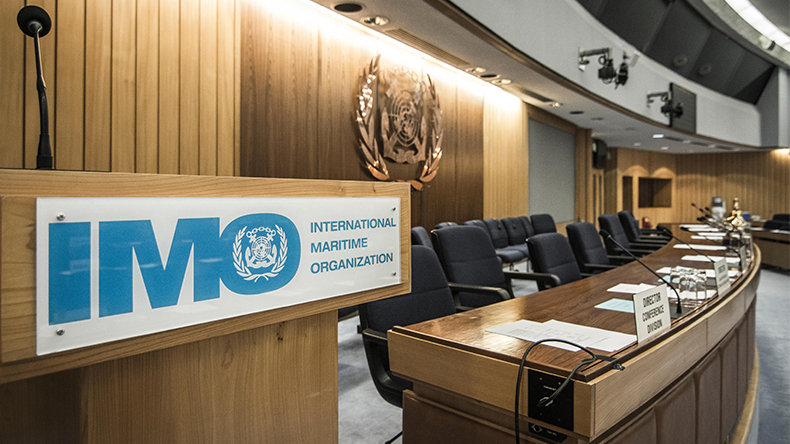
10/22/2025
The global shipping industry faces deepening uncertainty after the International Maritime Organization postponed a crucial decision on its Net-Zero Framework, creating what industry leaders describe as “decision-making paralysis” at a pivotal moment for the sector’s decarbonization.
The regulatory delay, forced through by United States opposition despite earlier approval, threatens to derail shipping’s energy transition and undermines the investment certainty that shipowners require to commit billions toward cleaner vessels and fuels. This development comes as data reveals a significant slowdown in orders for dual-fuel vessels, highlighting the tangible consequences of regulatory instability.
Key Developments: The IMO’s Delayed Decision
In an extraordinary session this October, IMO member states voted to postpone the adoption of a global emissions pricing mechanism and fuel standards that had been scheduled to take effect in 2027. The decision represents a dramatic reversal from earlier in the year when the same measures received overwhelming support.
The postponement follows what participants described as an “unprecedented campaign” against the measures, with U.S. officials accused of pressuring other countries with threats of tariffs, penalties, and visa restrictions. This opposition created a new alliance including Russia, Saudi Arabia, and other petrostates, successfully delaying the implementation until at least 2028.
IMO Secretary-General Arsenio Dominguez expressed disappointment with the fractious nature of the discussions, stating: “It is the time to really look back at how we have approached this meeting. My plea to you is not to repeat the way we have approached this meeting for future discussions.”
Industry Impact: Decision Paralysis Sets In
The regulatory uncertainty comes at a critical juncture for maritime decarbonization. According to industry analysis, fragmented regulation is undermining progress in decarbonization and limiting investment. The report warns that without sufficient regulatory support, the global shipping industry risks falling short of its net-zero targets.
-
Investment Hesitation: “What’s happening right now when we meet with our customers? We see for ourselves uncertainty and uncertainty causes inaction and lack of investment,” said Lasse Krisoffersen, CEO of car carrier Wallenius Wilhelmsen.
-
Regulatory Volatility: Ibrahim Al Nadhairi, CEO of Asyad Shipping Company, echoed these concerns: “We wake up every morning, there’s a new regulation”. This sentiment reflects the industry’s struggle to navigate an increasingly complex and unpredictable regulatory landscape.
The consequences are tangible: data from the first ten months of 2025 shows a marked plateau in orders for dual-fuel newbuildings, as shipowners hesitate to commit to significant capital expenditures without clear regulatory signals.
The Green Fuel Challenge: Availability and Cost
Compounding the regulatory uncertainty are fundamental concerns about alternative fuel supply chains and infrastructure:
Table: Alternative Fuel Cost Comparison
| Fuel Type | Price per Metric Ton | Price Benchmark |
|---|---|---|
| Very Low Sulphur Fuel Oil (VLSFO) | $456.80 | Rotterdam average |
| Green Ammonia | $1,848.31 | VLSFO equivalent in Northwest Europe |
| Premium Ratio | ~4x | Green ammonia vs. conventional fuel |
The significant cost premium for green fuels creates a chicken-and-egg dilemma: shipowners are reluctant to invest in vessels without guaranteed fuel supply at viable prices, while fuel producers hesitate to scale production without sufficient vessel demand.
“The availability of alternative fuels is still limited, and the infrastructure for their production, storage, and distribution is underdeveloped,” notes a recent industry study, highlighting the interconnected challenges facing the industry.
Broader Pressures: Geopolitics and Economic Headwinds
The shipping industry’s decarbonization challenges are further complicated by wider economic and geopolitical pressures:
-
Trade Policy Volatility: Shifting trade policies, including recent U.S. tariff announcements, are “constantly shifting” and “very difficult to keep up with,” resulting in higher costs for businesses.
-
Aging Fleet Concerns: The average age of the tanker fleet is increasing, with some industry leaders warning of “graveyards of floating environmental bombs” due to older vessels often lacking proper classification and insurance.
-
Growth Slowdown: Global maritime trade growth is projected to stall in 2025, a sharp decline from 2024, further tightening industry finances.
Path Forward: Navigating the Uncertainty
Despite the setbacks, some industry players are moving forward with transition strategies:
-
Targeted Retrofitting: Research suggests that “long-term compliance and financial performance are best achieved through targeted retrofitting supported by carbon taxes and favourable market conditions”.
-
Fuel-Agnostic Approaches: Some operators are considering more flexible strategies that maintain options across multiple potential fuel pathways rather than committing to single solutions.
-
Regional Compliance: With the EU’s Emissions Trading System already covering shipping and FuelEU Maritime rules in force, operators trading in European waters must navigate existing regulations despite global uncertainty.
Conclusion: A Critical Juncture for Global Shipping
The IMO’s decision to delay its Net-Zero Framework represents more than a temporary setback—it signals a potentially dangerous stagnation in global shipping’s decarbonization efforts. As one climate minister stated after the vote: “This is unacceptable given the urgency we face in light of accelerating climate change”.
With shipping emissions projected to rise significantly without intervention, the industry stands at a crossroads. The coming year will be critical in determining whether global cooperation can prevail over national interests to provide the regulatory clarity needed to navigate toward a sustainable future.
As one industry representative summarized: “The industry has demonstrated its commitment to change, but the reality is that without regulatory clarity and global alignment, investment and innovation will remain hesitant”.
References
-
International Maritime Organization. (2025). MEPC 83 Session Outcomes and Framework Delay Announcement.
-
Lloyd’s Register. (2025). Global Maritime Trends 2025 Barometer.
-
S&P Global Commodity Insights. (2025). Alternative Marine Fuels Price Assessment Report.
-
UNCTAD. (2025). Review of Maritime Transport 2025.
-
Journal of Risk and Financial Management. (2025). Barriers to Maritime Decarbonization Investment.

